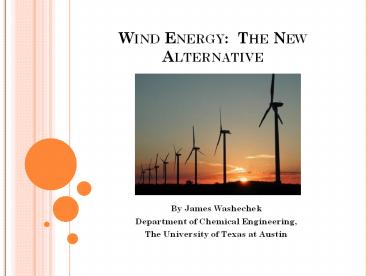Wind Energy: The New Alternative - PowerPoint PPT Presentation
Title:
Wind Energy: The New Alternative
Description:
WIND ENERGY: THE NEW ALTERNATIVE By James Washechek Department of Chemical Engineering, The University of Texas at Austin DESCRIPTION OF WIND TURBINES Converts wind ... – PowerPoint PPT presentation
Number of Views:217
Avg rating:3.0/5.0
Title: Wind Energy: The New Alternative
1
Wind Energy The New Alternative
- By James Washechek
- Department of Chemical Engineering,
- The University of Texas at Austin
2
Description of Wind Turbines
- Converts wind kinetic energy into electrical
power - Numerous industrial turbine designs, for example
horizontal and vertical axis wind turbines - Clean energy alternative, with little to no
environmental impact - Affects environmental aesthetic integrity, some
migratory bird patterns, and downwind wind
velocity.
3
History of Wind Powered Turbines
- 200 B.C. Wind powered machines utilized by
Persians. - 1888 Charles F. Brush developed first energy
producing windmill in Cleveland, Ohio. - 1980s - First modern wind turbines were
constructed. - Past 20 years Newer, better designed wind
turbines have been developed.
4
Future Wind Energy Capacity
- Increasing exponentially
- 3 to 5 times larger energy capacity over next 6
years - 20 of electrical energy supplied by wind energy
by 2030
World Wind Energy Capacity Approximation (Wiki,
2008)
5
Turbine Power
- Directly proportional to density of air, area of
rotor blades, and cube of velocity - Efficiency of internal parts affects maximum
power available - Limited to 59 maximum efficiency
where, P power (W) a design efficiency
factor ? density of air (kg/m³) r
radius of wind turbine (m) v velocity of
wind (m/s)
6
Comparisons to Other Energy Sources
- Environmentally friendly
- Large resource supply
- Cheap operating costs, 1cent/kWhr
- Wind 55.80/MWh
- Coal 53.10/MWh Natural Gas 52.50/MWh
Wind
vs.
Coal
Natural Gas
7
Horizontal Axis Wind Turbine (HAWT)
- Most common industrial design today
- Wind sensors to rotate tower in yaw direction
- Many found in West Texas where wind velocities
are high
Horizontal Axis Wind Turbine Design
8
HAWT Advantages and Disadvantages
- Advantages
- Disadvantages
- Variable wind pitch to optimize amount of wind
absorbed. - Able to increase height of tower to harness
higher wind velocities at higher altitudes. - Already the major design for industrial wind
power generation.
- Inefficient close to ground level due to
turbulence - Must be large scale making expensive construction
costs - Must be comprised of strong materials (carbon
fiber and steel) to deal with high winds
9
Vertical Axis Wind Turbine (VAWT)
- Gearbox and generator at base of vertical rotor
shaft. - Utilizes wind flow in all directions (360).
- Constructed on buildings to avoid ground level
turbulence.
Vertical Axis Wind Turbine Design
10
VAWT Advantages and Disadvantages
- Advantages
- Disadvantages
- Cheaper due to less height needed for effective
operation. - No motor is needed to turn rotor blades.
- Routine maintenance easy due to components being
situated under vertical rotor shaft - Little chance of structural failure
- Create only half the amount of energy of a
comparable HAWT - Cannot harness higher winds at higher altitudes
due to smaller height. - Complete deconstruction for maintenance.
11
Conclusions
- Horizontal axis wind turbine the preferred design
for future industrial use. - Future efforts in wind energy technology.
- Combination of wind energy with current energy
infrastructure.
Airborne Wind Generator
12
References
- Hansen, Martin O.L. Aerodynamics of Wind
Turbines, 2nd Ed. Earthscan Publications Ltd,
January 2008. - Hau, Erich and H. von Renouard. Wind Turbines
Fundamentals, Technologies, Application,
Economics, 2nd Ed. Springer, October 1, 2005. - McCabe, W.L. and J.C. Smith. Unit Operations of
Chemical Engineering, 7th Ed. McGraw-Hill, New
York. - Ragheb, M. Theory of Wind Machines, Betz
Equation. 16 Nov. 2008 lthttps//netfiles.uiuc.ed
u/mragheb/www/NPRE20498WP20 Wind20Power20Syste
ms/Theory20of20Wind20Machin es20Betz20Equatio
n..pdfgt. - "Wind Power." Wikipedia The Free Encyclopedia.
10 Nov. 2008 lthttp//en.wikipedia.org/wiki/Wind_p
owergt. - "Wind Turbine." Wikipedia The Free Encyclopedia.
17 Nov. 2008 lthttp//en.wikipedia.org/wiki/Wind_t
urbinegt.































